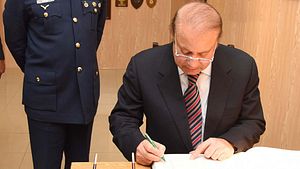The Panama leaks corruption saga continues to dominate Pakistan’s domestic politics. The opposition parties, after a year-long protest movement both inside and outside Parliament, have finally taken the case to the country’s top court. For the last two weeks, the Supreme Court of Pakistan has been hearing the case on a daily basis. The case concerns the prime minister of Pakistan, Nawaz Sharif, and his immediate family, who are accused of money laundering abroad.
While the top court’s decision to hear the case on a daily basis highlights its intention to conclude the case soon, political parties’ attempts to influence the decision through media campaigns are only going to toughen the court’s scrutiny of the prime minister and the opposition’s council.
Apparently, the politicization of the case outside the court is aimed at pressuring the country’s top court into making concessions. In this regard, the Pakistan Tehreek-e-Insaaf (PTI), the opposition party leading the campaign against Sharif’s alleged involvement in the scandal, has on numerous occasions said that the court’s verdict would decide the future of Pakistan itself. The government’s legal team, on the other hand, has maintained that the case has only been propped up due to political reasons and there is no evidence to prove that the country’s prime minister or his family ever transferred funds overseas illegally.
Meanwhile, the court’s dilemma lies in preserving its impartiality while making sure that that the ultimate verdict is just and fair for all parties involved. Over the last decade, Pakistan’s top court has attempted to come out of the shadows of other institutions that have traditionally undermined its independence. The decision in this case is not only going to decide the immediate future of Pakistani politics, but will also have lasting impact on the credibility of the court itself.
Since the trial began two weeks ago, the court’s scrutiny in terms of analyzing the submitted evidence has only intensified. For instance, the court has gone as far as saying that the prime minister’s comments about his life being an “open book” do not seem convincing. The prime minister “had said that his life was an open book, but we feel that several pages of that book are missing,” said the judges in their remarks a few days ago.
The court has equally grilled the opposition parties’ legal team for its inability to present credible evidence. At a January 12 court hearing, the tribunal in its remarks told the PTI’s lawyer that they cannot send home a sitting prime minister on the basis of media reports and news clippings. “You need to satisfy the judges, not the media,” said the court in its comments.
The interests of involved political parties in this case are not only limited to finding a balanced and fair resolution of the issue. Imran Khan’s political party is using the Panama leaks issue as bait to gain some leverage in terms of luring the urban voter constituency in Punjab while Sharif doesn’t want to see his government’s credibility weakened through the case. In the worst case scenario, Sharif wants to prevent his own removal from the prime minister’s office.
The stakes involved in the case underscore that the court’s final judgment is not going to favor one party or the other; rather, it’s going to be a balanced one where all involved parties are offered some face-saving outcome.
The tribunal is aware that its verdict could have wide-ranging and dramatic consequences outside the trial. Any semblance of an unfair judgment may begin a new wave of protests where the role of the judiciary as an independent institution may also come under question.

































